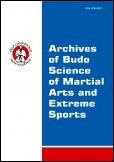2018, Volume 14, Issue 1
Acute effect of ischemic preconditioning on the performance of judo athletes
ALINE APARECIDA DE SOUZA RIBEIRO1, JEFFERSON DA SILVA NOVAES2, DANIEL GODOY MARTINEZ3, LUIZ GUILHERME DA SILVA TELLES2, MATEUS CAMAROTI LATERZA3, FRANÇOIS BILLAUT 4, LEANDRO RAIDER1, JEFERSON MACEDO VIANNA3
1EDUCAÇÃO FÍSICA, Center of Higher Education of Valença / Dom André Arcoverde Educational Foundation, Brazil, VALENÇA, Brazil
2Rio de Janeiro Federal University, Brazil, RIO DE JANEIRO, Brazil
3Juiz de Fora Federal University, Brazil, JUIZ DE FORA, Brazil
4Department of kinesiology, Laval University, QUEBEC, Canada
Author for correspondence: ALINE APARECIDA DE SOUZA RIBEIRO; EDUCAÇÃO FÍSICA, Center of Higher Education of Valença / Dom André Arcoverde Educational Foundation, Brazil, VALENÇA, Brazil; email: ALINEVALENCAEDFISICA@GMAIL.COM
Full text
Abstract
Background & Study Aim: Ischemic preconditioning may improve the physiological responses and performances of athletes in different sport modalities. Similarly, judokas could also benefit from augmneted performance the day of a competition. However, until now, there is no evidence of the effect of ischemic preconditioning pocedure (IPC) on the performance of these athletes. Thus, the objective of this study was the effect of IPC on the performance of judo athletes.
Material & Methods: The study involved 17 judo athletes (age 21.35 ±3.46 years, practice time 8.94 ±3.88 years, height 1.73 ±9 m, body mass 69.34 ± 10,94 kg). In the first session, they answered the questionnaires, performed the anthropometric evaluation, the familiarization of the Special Judo Fitness Test (SJFT). The SJFT was used to evaluate the athletes' special physical fitness. In the second and third sessions, two experimental protocols were performed in a randomized and counterbalanced manner: a) IPC (3 cycles x 5 min ischemia at 220 mmHg / 5 min reperfusion at 0 mmHg) + SJFT and b) SHAM (placebo session: 3 cycles x 5 min ischemia at 20 mmHg / 5 min reperfusion at 0 mmHg) + SJFT. A 30 minute interval between the experimental protocols and the SJFT and 72 hours between the 2nd and 3rd sessions was observed.
Results: After performing IPC, judokas performed the highest number of throws in the series (A) and the total number of throws (A+B+C). The SJFT index also showed a significant improvement over the SHAM session.
Conclusions: IPC accutely improves specific performance of judo athletes, and may therefore be used during competitions.
Key words: Special Judo Fitness Test, placebo, athletic performance, throws, vascular occlusion





